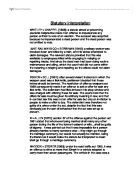Q. ‘During the last 30 years there has been a shift from the literalist approach to purposive methods of construction. When there is no obvious meaning of a statutory provision the modern emphasis is on a contextual approach designed to identify the purpose of a statute and to give effect to it.’ Lord Steyn. Discuss. [25 marks]
Ans. When the parliament has enacted a statute questions inevitably arise as to the meanings of certain words or phrases. Despite how carefully the parliament counsel has drafted the original bill, some error may have been overlooked. Also, English language is and imperfect means of communication-some words are designed to cover a number of possibilities and are therefore ambiguous and vague. With the development of new technology and changes in the meaning of words over time old acts of parliament may not apply to present situations. It is thus the responsibility of the court to interpret statutes and other legislations.
Traditional English thinkers in the 19th and 20th century were in favor of the literalist approach. The literalist approach involves the courts maintaining a word’s literal meaning regardless of the consequent absurd outcome. This approach was preferred as it respects and upholds parliamentary supremacy. It also assumes that anyone who can read English can determine the law, which promotes certainty and therefore reduces litigation as lawyers can advise their clients on the probable outcome of the case. However, it fails to recognize that English language is ambiguous and has therefore resulted in many harsh decisions leaving many worthy claimants with injustice. This can be illustrated in the case of London & North East Railway Co. V Berriman (1946) – A widow tried to claim compensation for her husband who had been killed while oiling points along a railway line as there was no lookout man provided for him. The Fatal Accidents Act stated that a lookout should be provided for the purpose of ‘relaying or repairing’. As oiling points did not fall into either category Mrs. Berriman’s case failed.







